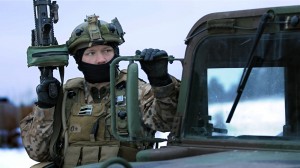
A Latvian soldier trains with other NATO troops in Hohenfels, Germany for combat duty in Afghanistan.
The meeting of the 2010 spring session of the NATO Parliamentary Assembly in Riga at the end of May will not make headlines around the world, but it will have an impact on all our lives.
But it’s the kind of impact people tend to take for granted and don’t think much about. After all, we create armies to protect us and as civilians involved in business, culture, politics (or just living for its own sake), we are more than happy to let the men and ladies in uniform do all the heavy lifting when it comes to national security.
And yet, the militaries of the 28 countries that make up the NATO security alliance couldn’t do what they do very well if they didn’t have full civilian support as well as political direction. The parliaments of the 28 NATO member states provide that support and direction, and they get together twice a year to make NATO a more effective alliance.
Meeting in Riga from May 28 until June 1 will be 257 leading politicians from parliamentary bodies of every shape and description. Among them will be 36 politicians from the U.S. Senate and House of Representatives, 18 members of the British House of Commons and House of Lords, 18 French legislators from their Assemblée Nationale, 18 members of Germany’s Bundestag, and 12 representatives from the Turkish Grand National Assembly. Not to mention 155 other members of parliaments that go by such nationally distinctive names as the Folketing, Riigikogu, Državni Zbor, Országgyűlés, Stortinget, Alþingi, Camera Deputaţilor, Seimas, Eerste Kamer/Tweede Kamer, and La Chambre.
Although Latvia’s Saeima will be represented by 3 delegates, it has a special role in this Assembly because it is the official host and organizer of the 2010 Spring Session. If you want to know more about what’s in store for the parliamentary policymakers of NATO, go to the Saeima’s special web site at www.natopariga.lv. You’ll find everything you want to know about the Assembly, including schedules, participants, and issues, and get a warm greeting from Latvia’s Head of Delegation, parliamentarian Vaira Paegle. (And, if you’re dying to know which country calls its parliamentary body the Országgyűlés, go straight to www.natopariga.lv/en/participants-/delegates. Learn them all and you can really impress your friends at the next cocktail party.)
This is the biggest NATO event to take place in Latvia since the 2006 Riga Summit. In addition to the 257 official delegates, there will be 108 more parliamentarians from non-NATO states and organizations who are associate members, regional partners or observers (from countries like Japan, Egypt, Israel, Sweden and Tunisia). When you add in their advisers, NATO technical staff, translators and international media representatives, nearly 700 people will be in Riga for four days from Saturday through Tuesday to talk about NATO business.
While presidents and prime ministers met at the Riga Summit in 2006 and parliamentarians will meet here in 2010, NATO’s vital civilian support is not just made up of politicians. The Latvian Transatlantic Organization (LATO) recently celebrated its 10th anniversary as Latvia’s leading pro-NATO NGO. Although Latvia joined NATO just 4 years ago, the enthusiastic young men and women of LATO were out informing, explaining and supporting Latvia in NATO for 6 years before that.
It only makes sense that the idea for establishing LATO in 2000 came from Imants Lieģis, who at that time was serving as Latvia’s ambassador to NATO. He was Latvia’s top man in charge of lobbying Latvia’s NATO membership in Brussels, and the creation of a grass-root NGO like LATO was a visionary move. It also makes equal sense that 10 years later, Ambassador Lieģis has now become Minister Lieģis and heads the Latvian Ministry of Defense.
LATO not only took an active part in 2006 Riga Summit but also helped launch the prestigious Rīga Conference which brought together the world’s leading foreign and security policy experts to talk about NATO-related issues. The Riga Conference is now an annual event regularly attended by both presidents and parliamentarians.
Why is this meeting in Riga so important? The NATO Parliamentary Assembly takes decisions which affect the NATO Summit, and decisions at the NATO Summit have an impact on every one of the 28 member states, as well as all the countries around the world that seek to join or cooperate with NATO. The NATO Parliamentary Assembly is a critical part of this ongoing global decision-making chain.
I’m sure that most of us won’t feel the impact of the Riga Parliamentary Assembly in our daily lives, but if you think about it, that’s good. It just means that an organization dedicated to promoting peace and ensuring the security of its member states is doing its job.
Ojārs Kalniņš is the director of the Latvian Institute. The Latvian Institute (Latvijas institūts) was established by the Latvian government to provide a wide range of information about Latvia, its society, culture and history. For more information visit www.li.lv.
Disclaimer:
Views expressed in the opinion section are never those of the Baltic Reports company or the website’s editorial team as a whole, but merely those of the individual writer.












